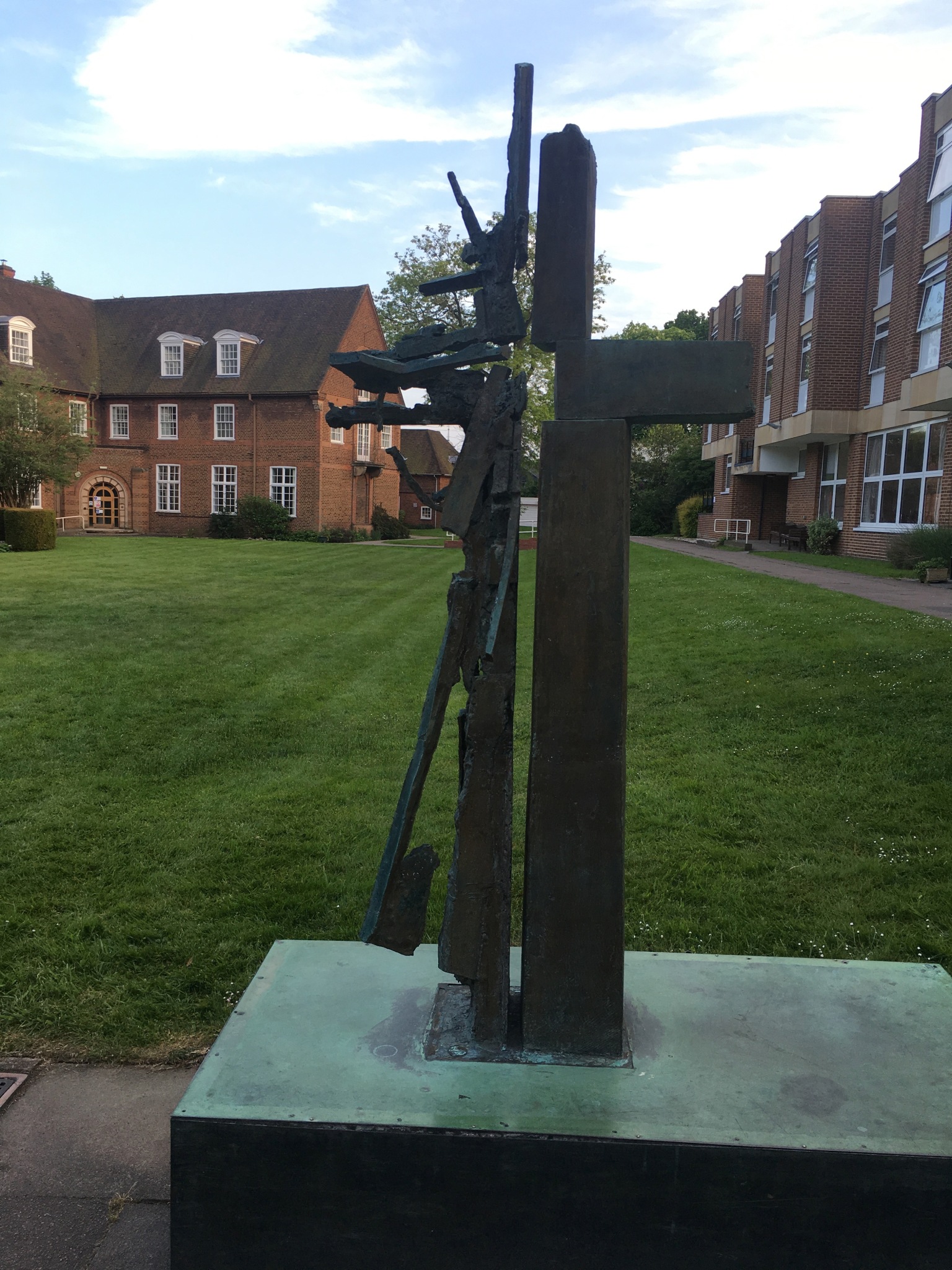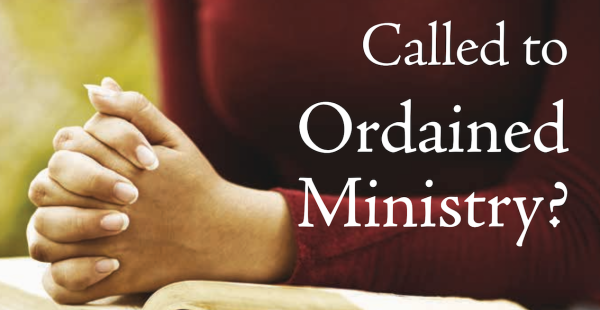I have come to the end of my time at The Queen’s Foundation in Birmingham. To explain, this is the college where Methodists receive pre-ordination training prior to being sent out to various places across the country as ministers. The training can take two years and is composed of a series of academic modules, training placements and importantly time to reflect. This isn’t merely a theoretical grounding in doctrine etc but a time of formation; hence, the sculpture at the entrance of the College.

Which side do you enter the cross from:
(1) the side which is fragmented but becomes formed into completeness or
(2) the side which is built, structured but becomes broken for God to use?
I wondered just what has changed over these two years at Queen’s?
One thing I recall very early on at Queen’s is community. We come from near and far to live and study, possibly giving up employment, moving away from family and friends. Either living full-time in the flats or at Frances Young House (FYH), or Monday to Thursday in FYH, or over various weekends throughout the year in the older College Buildings, this is a never-ending seamless changing maelstrom, that is community: not in a negative sense – this is a positive beneficial caring community. As we develop personally we need this group of people where we can be supported or support each other as life ebbs and flows. I love that regardless of the course that you are studying we all eat together, celebrate or commiserate together, worship together, walk alongside each other. The Partner’s group is flourishing as well, supporting those who will not just accompany ministers but play such a role in ministry. Tutors here may make every effort to welcome the families, support them and provide information on what might be expected relevant to today’s context. They even have a social programme!
Anglicans also join us as this is also one of the many colleges where they can also be formed prior to being ordained as Deacons. It has been wonderful to reflect on the differences and the similarities between the denominations, the way that the Diaconate has evolved from the way the Church of England has seen the order of ministry of service, and the way that the Methodists have released it from hierarchy and enabled it to flourish in a particular sense.
Here again is another charism: worship. Where else might you experience worship in such a diverse array of ways? From the free-flowing experiential joyous Pentecostal worship where the passion emanates from every element of the service; to the relatively free-flowing Methodist worship, replete with Wesleyan hymnody and the Covenant Prayer; to diverse Anglican liturgy, ranging from extempore to ‘high up the candle’; to Taizé and its beautiful repetitive choruses which gently caress your soul; and to Greek Orthodox, which provides a beautiful seamless blend of chants and readings : all are worship to God. It emphasised to me that not one way of worship is sufficient. I am reminded of Matt Redman’s song “Back to the Heart of Worship” where it was thought that the church stopped using the worship band for a period of time but focussed upon God.
“When the music fades
All is stripped away
And I simply come
Longing just to bring
Something that’s of worth
That will bless Your heart” ©Matt Redman
There may be elements of each form which can both be attractive and beneficial, whilst others may not act as that conduit for your own particular worship on that day. Don’t dismiss that style of worship though. I have found that what was important was that we rest in God, let the worship flow over you, and on those days drink from the refreshing streams and be refilled, renewed. Possibly we may need to seek God in those forms of worship which we “don’t like” – for God is there also.
…it is like slowly meandering in warm treacle, reflecting on where you have been and where you are going, and it is always sweet!
My pattern of life has also changed.
 No longer ruled by 9-5 schedules, the focus for me now is drawn by God. Yes we still have written assignments with their associated deadlines to complete but we keep hearing that “it is your diary“, I can now fill it as I need. There will still be those necessary meetings, appointments with those who need support, opportunities which arise for new beginnings but within these there are wonderful times of rest and being with God. Time to read scripture, time to pray, time to reflect, time for yourself is a necessary part of ministry life – for me as a Deacon, a Rule of Life – and it starts to be learnt at Queen’s. We only have lessons Monday-Thursday and so for the remainder of the week you have to assign time to complete the necessary reading (more of this in a moment), write those assignments, attend the local church where you support and also worship, and rest. In my secular work life this last aspect was always the first to go! You are left to decide how this may be achieved – good preparation for ministry life!
No longer ruled by 9-5 schedules, the focus for me now is drawn by God. Yes we still have written assignments with their associated deadlines to complete but we keep hearing that “it is your diary“, I can now fill it as I need. There will still be those necessary meetings, appointments with those who need support, opportunities which arise for new beginnings but within these there are wonderful times of rest and being with God. Time to read scripture, time to pray, time to reflect, time for yourself is a necessary part of ministry life – for me as a Deacon, a Rule of Life – and it starts to be learnt at Queen’s. We only have lessons Monday-Thursday and so for the remainder of the week you have to assign time to complete the necessary reading (more of this in a moment), write those assignments, attend the local church where you support and also worship, and rest. In my secular work life this last aspect was always the first to go! You are left to decide how this may be achieved – good preparation for ministry life!
Reading! As a scientist, reading was something where you could gain an understanding of a particular technique or the operation of some computer code. It didn’t take too long in general. With theology don’t expect the same!!
I have now found such a delight in settling down with a hefty tome and wading. It is an interesting phrase: it conjures up to me this spectacle of being in thick mud and struggling to make progress. I would counter that by saying it is like slowly meandering in warm treacle, reflecting on where you have been and where you are going, and it is always sweet! Often theology books are devoid of an index (thank goodness for Google Books) but this can also be a blessing as once you dip into the material you are drawn into a wonderful web which unravels allowing you to see more clearly where God is taking you. My book collection, to the possible annoyance of my wife when the number of the books exceed the space available in the book-case and they start to migrate across the living room floor, has increased markedly and I have a passion now for reading about the Gospels, the history of the early days of the faith and our understanding of gender. Theological reading is not confined to old dusty tomes either: liberation theology has shown that being political is absolutely fine; queer theology pushes the boundaries on so many levels. It is delightful. One website I would recommend to save money is this comparison site: https://www.usedbooksearch.co.uk.
Lastly my calling has changed. This may alarm the Methodist Church…
Spoiler Alert: the calling has become deeper! It has not become stronger in a particular field but my perspective has been opened to consider where God is taking us, what opportunities could arise? I arrived here feeling I knew what project I could set up, where I could be useful for the Church: expect that to be turned on its head. Where is God calling me? I though initially that I would be going to an urban centre for a particular marginalised group. I am so looking forward to going to West Yorkshire now and letting God show me where I am needed, being open to where God is working already and where God wishes me to be.
I hope this may be useful for those interested in being trained at Queen’s.